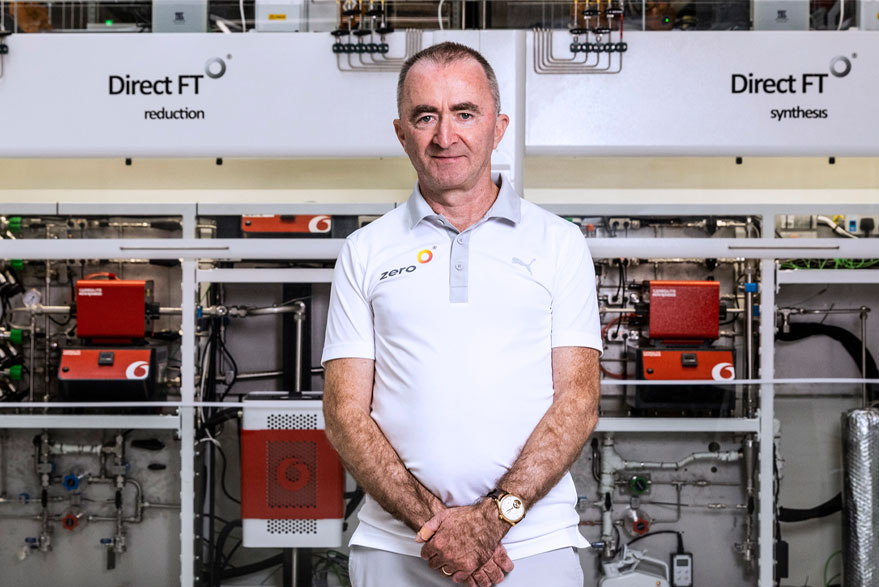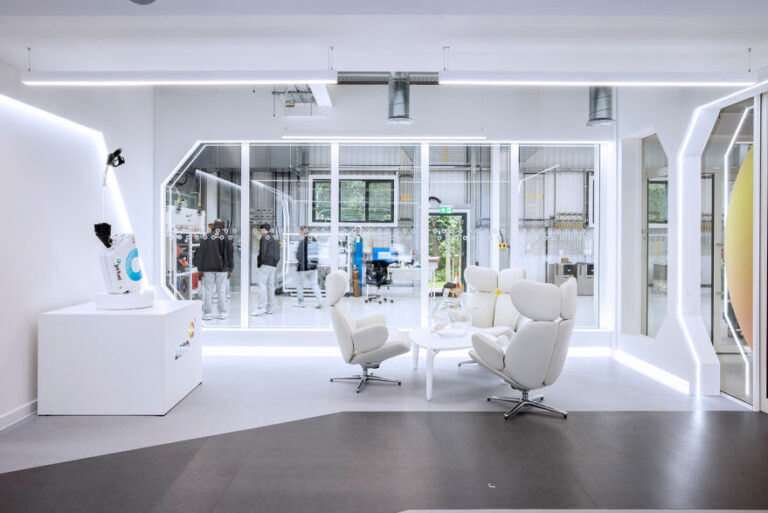Paddy Lowe has been the mastermind behind the development of seven world championship-winning cars as Executive Director of Mercedes, Technical Director of McLaren and Chief Technology Officer of Williams.
Paddy gained 12 F1 World Titles and 158 race wins during his career but his latest quest is far bigger than any of those feats – to break car drivers’ dependence on fossil fuels with the combustion engine.
He’s doing do it with petrol (fuels and petrochemicals based on hydrocarbons) and sees classic car owners as ‘a key group of motorists’ in his campaign.
Paddy said: “The exciting news for classic car owners is that they can really help with the early traction on using sustainable fuels. They don’t use a lot of fuel. It’s their leisure activity because they are not doing long commutes so they should be prepared to pay more for fuel in early days than somebody who needs to get to work in their car.
“I would like to see this classic car community help to drive the development and adoption of synthetic fuels from these early days.”
Paddy is co-founder of British company Zero, working to develop replica fuels from air and water that is compatible with any engine system – and with the same power and performance for existing engines.
He said: “We make a replica EN228, the UK and European standard for pump gasoline and petrol. When you buy your 95 petrol at the petrol station, that’s being supplied to the EN228 standard.
“Classic car owners won’t have to alter their engine with sustainable fuel and there is not the worry about ethanol that is in E10. Ethanol dissolves in water and can cause corrosion.
“For me, the end point is that every drive (plus every plane flight and ships’ sailing) will within a decade be on 100 percent synthetic fuel with all petrol pumps delivering synthetic fuel because we’ve got to stop digging oil from the ground and make it from scratch.
“The real breakthrough-thinking is that these fuels don’t have to come from underground.
“In my vision, the first petrol pump in the world selling synthetic fuel would be in a prime location in London. There’s a petrol station in Park Lane, that’s a good address, or near our head office, the Michelin building, in the Fulham Road.
“I’d like to see this first petrol pump working as soon as possible, definitely inside three years. I hope my team read this, that’ll put them on the spot!”
What’s the difference between biofuels and synthetic fuels?
Not everybody is clear on the difference between bio-fuels and synthetic fuels so Paddy explains: “We can make fuel from crops (biofuels) and for instance, that is already on the petrol pump at Bicester Heritage, the UK hub for classic cars.
“Bio is the wrong word because these are agri-fuels, they come from agriculture – but let’s not pretend they just come from nature. It’s not entirely fossil-free because a lot of fossil fuel is used to cultivate those crops.
“There are all sorts of fuels coming from used coffee grounds to sewage but it all goes back to agriculture. The sewage solution sounds interesting but it’s not really a waste because it would otherwise be part of our fertiliser programme which uses a lot of fossil fuels to create, typically 50 to 70 percent fossil fuel.
“When you go to the petrol pump the E10 means that’s 10 percent ethanol, that’s actually bio-ethanol or agri-ethanol and the B7 in diesel is seven percent bio-diesel.
“None of this is a full solution; to halt global warming we can’t just do half a job, we’ve got to completely stop using fossil carbon and putting it in the atmosphere.
“The second problem is scale. If you took any of those agri or bio examples, it just tickles the problem. The amount of fuel we use globally is astronomical that’s why my focus is on making synthetic fuels where the source energy comes from a truly industrial renewable source like wind power or solar power.
“Nuclear can also be considered as a renewable, at least a sustainable source of energy not requiring agriculture.
“I like to give this analogy: Leaves are very good at doing a job because over millions of years they have gone into that biological solution but their primary objective was not to be efficient.
“So it’s a bit like the difference between a horse and a Formula One car. A horse can do a lot of things but it’s not very powerful in terms of industrial or human technological solutions. The same with a solar panel, it’s something like 25 times more efficient than a leaf converting sun to energy. So should I turn a field into a solar farm or keep growing crops? From an energy point of view, the solar panel is far more efficient.
“At Zero we’re taking that energy and making fuel using two ingredient molecules – hydrogen that comes from water, obviously abundant, and taking CO₂ from the atmosphere. When we make the fuel and then burn it, all of that water and CO₂ goes back to where it started so it’s a fully circular process.
“It’s 100 per cent fossil-free and we can do that forever without any change in the balance of the ambient materials, water and CO₂.”
‘We can get to cost parity with sustainable fuels’
Paddy also thinks that the price of sustainable fuels will eventually drop to equal fossil fuel. He said: “I believe we can get to cost parity with fossil fuels – that’s not true of bio-fuels, they don’t have that profile to get cheaper. At the moment they can be three, four, five, six times as expensive as fossil fuel.
“Essentially it goes back to agricultural land which is not getting any cheaper so there’s no real opportunity to reduce the cost of bio-fuels. Whereas the sustainable process is entirely mechanised with industrial solutions, starting from the solar panel through to synthesis of the fuel. It’s all a machine, it’s a factory and the ingredients are air and water, which are free. We can even include sea water if you want to look at places where there’s a shortage of water.
“That means like every industrial solution in history, it’ll keep getting cheaper. The first one is always super-expensive and then it just gets cheaper and better. Here we have exactly that same profile and, arguably, even better because if you look at any normal product like a car you still need iron and aluminium, and there’s a cost of your inputs, whereas our inputs are water and air so we haven’t got any supplier to pay on the front end.
‘Picture these comparisons’
When it comes to solar power versus agriculture Paddy gives a couple of scenarios.
He said: “If we took six percent of Australia’s land area, because a large proportion of Australia is technically uninhabitable, and made it into a solar farm, that would produce the equivalent of all the oil we use on earth today.
“If we took all of Ireland into cultivation to grow jet fuel as an agricultural crop factory, that would supply only British Airways. So this shows bio-fuels are not the answer.
“Solar power is now being harnessed across all parts of the world; North Africa, Central America, Mexico, India, Pakistan, Egypt and the US and are building some of the biggest solar farms in the world so momentum is already building.”
Much cleaner running for classic cars
From all the tests Zero has carried out, Paddy says ‘sustainable often delivers more power than the standard fuel’.
He said: “It’s a very pure fuel made from hydrogen and carbon so evidence would suggest lower-side contaminants than fossil fuels to provide much cleaner running for classic cars.
“When we supply an EN228 replica gasoline, we won’t need to put in any ethanol because the fuel is renewable.”
He adds: “There will be other players; we have fuel suppliers in the UK that can ship specialist fuels, such as Anglo-American Oil, one of our investors based on the South Coast.
“Anglo-American distributes specialist classic car fuels and racing fuels including the supply to most of the entrants at the Goodwood Revival where every car had to use sustainable fuel. They brought it in a truck to the event. In due course we will be working with Goodwood on synthetic fuel solutions. I’ve got great admiration for Duke of Richmond being a pioneer in creating such a forward-thinking mandate.
“And Formula One is bringing in effectively a mandate from next season to be 100 percent sustainable which includes bio-fuels or synthetics. These enforcements will build momentum in terms of driving the market and driving the information to people.
“It’s all very good for our sector, driving the technology and the awareness.”
About Paddy Lowe

At Williams, he masterminded the active suspension system that allowed the FW14B to blitz the competition in 1992. At McLaren he helped to tip the balance in Mika Häkkinen’s favour during his World Championship battles with Michael Schumacher in 1998-1999 and was engineering director for the first of Lewis Hamilton’s world titles in 2008. As executive director at Mercedes from 2013-2017, he laid the foundations for the team’s dominance of the V6 turbo era.
Paddy Lowe and Professor Nilay Shah are co-founders of Zero, a manufacturer of non-biological e-fuel based in London and at Bicester Motion, Oxfordshire.
Zero is one of the first companies in the UK working on synthetic fuels with 40 scientists, technicians and chemists based at Bicester Motion.

